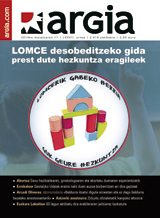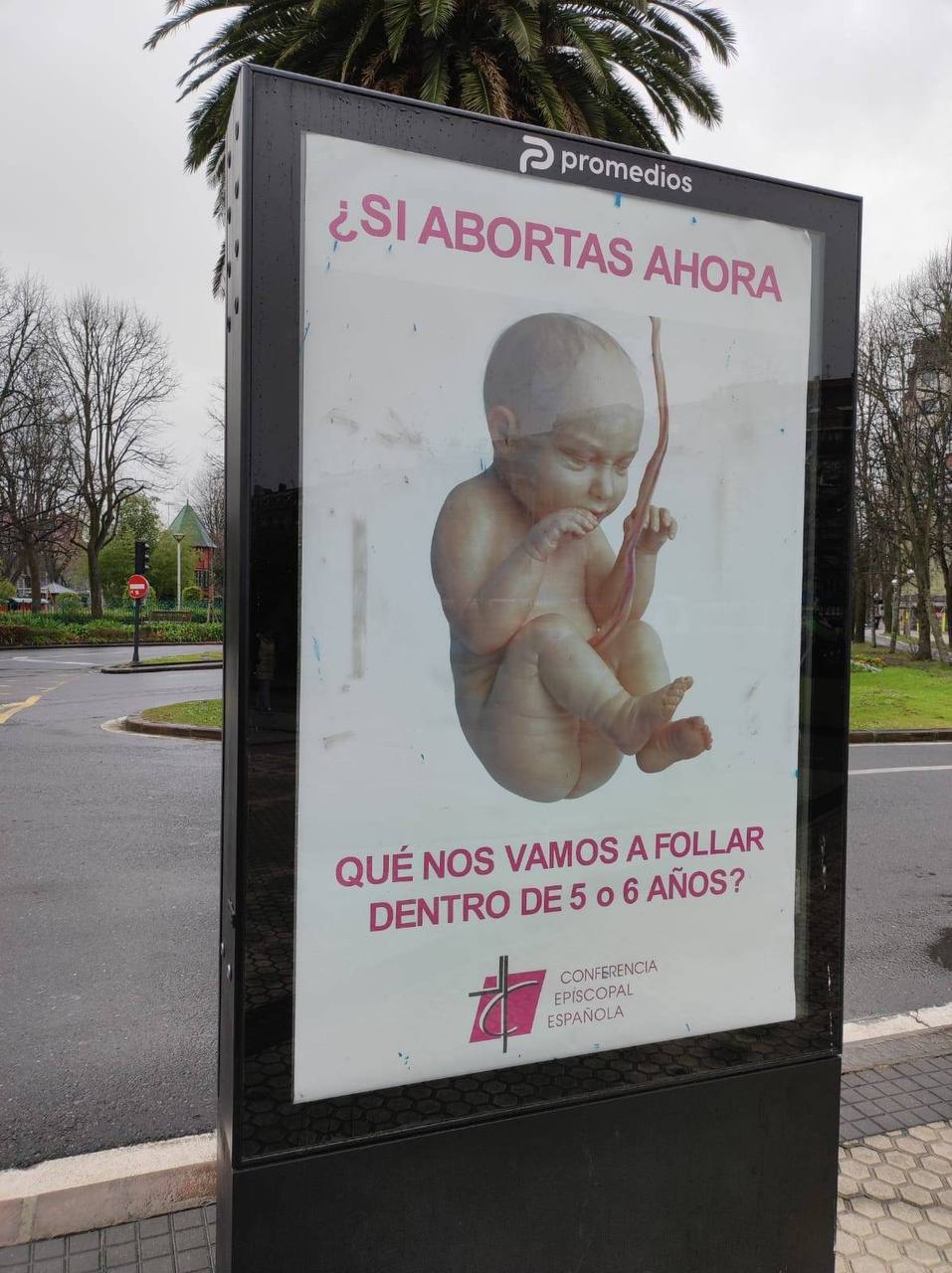Responsible Decision
- Tabua has been abortion. Now, however, it has jumped to the first page, following the proposal of the Minister of Justice, Alberto Ruiz Gallardón, to amend the Organic Law of Sexual and Reproductive Health. We have given the floor to three people who live the subject closely: the young aborted woman, the gynecologist and the sex educator. All three have come together: abortion is a coherent and responsible decision.
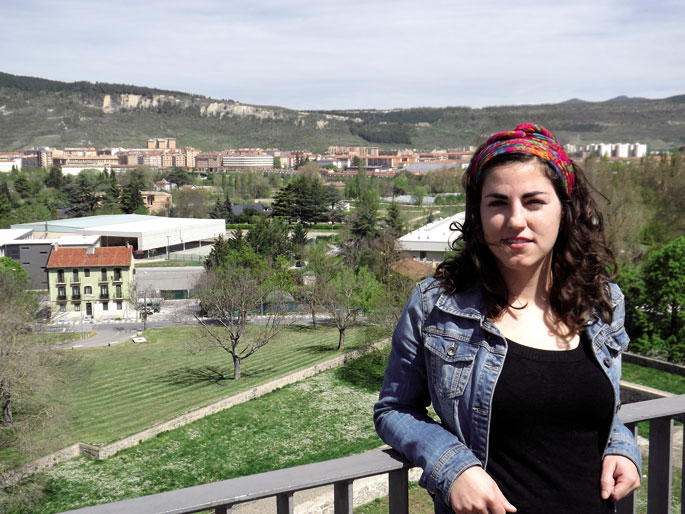
June Moreno. It was clear that I would abort
June Moreno is a 23-year-old Pamplona girl who has studied Psychology and works at the School of Psychology. She aborted last year, at 22. It was decided instantly. Reason, light: I didn't want her son. “I have no sense of guilt, of victim... I made the decision, consciously and responsibly.”
“I always use condoms and had no suspicions. But once the last day of the rule was broken. I was doing college tests, and I didn't do any tests. I didn't even take the morning-after pill. Wrong decision.” Assume what happened: “It was my fault.”
Two months later she learned that she was pregnant, as the rule did not come to her. “I did the test and gave me the yes. The moment was amazing.” Smile, aware of the importance of having discarded referrals among those who have aborted: “Abortion has been a positive experience. Not nice, but positive.”
Overcoming the initial scare of her pregnancy, she started to move around, sure she started the process: “It was clear that I wanted to abort, I didn’t make any other choice.” At that time, he listed eleven reasons why you can't have a child, but the important thing is that you don't want. “I was studying in college, I had a partner, but I didn’t care. It wasn't my moment, neither economic nor social ... We don't even think about it. They told us that I don’t know what financial support was there, but that doesn’t matter to me if I don’t want it.” The
next step was going to the clinic. Now, abortion can be aborted in Navarra, in a private clinic, but at the expense of Osasunbidea.
Moreno had to move to the centre of Ansoáin, where he was admitted since last July. “It was very easy. I felt at ease. I went with my mother and my partner, and that also helps.” Despite her good memory, she complains that Navarre women cannot access the public health service. This has negative effects that, in their opinion, "victimizes" those who abort: “You go silently, the clinic is far from the center of the city. That also makes you feel guilty. You ask yourself: What do I do here, in the abandoned polygon? It's not like going to the public hospital."
Aborted, she decided to tell the others. In this sense, he stressed that the deceased "had great support". However, it is clear that he has been lucky and that in the heteropatriarchal system not everyone can live in freedom the option of interrupting pregnancy. “It’s common to feel guilty, and that’s society’s fault.”
Moreno does not consider himself a victim and does not believe that his family or friends see her like this. However, he has noticed some inertia in dealing with the issue, and has been critical of them. “For example, after abortion, the eternal question: How are you?’ And they didn't ask how I was physically, but mentally, psychologically ... Many times it was like saying ‘ay, poor!’. I know the people around me don't do it on purpose, but sometimes the questions ... How are you psychologically? or did it cost you? No, it didn't cost me! And it's done!" He complains about the greatness that the choice usually takes and leaves the question in the air: “Why do we make such a big ball with abortion?” And he's looked at his experience. “In my case it’s not that much. I did it because I decided it. So, I’m fine.”
In addition to the concept of victim, there is a term frequently mentioned by opponents of the right to abortion: guilt. Women who abort feel guilty. But Moreno thinks it's a simplistic way to explain the issue. It only takes action on its own behalf. “Not everything has been aborted, has felt guilty, mentally ill... To me, it was quite the opposite. The opportunity to continue with my life, the one I want.”
Moreno is a feminist. Aware of the structural differences and advocates of a freer world. He knows that has helped him bring the process better. “Before I got pregnant, I knew there was a chance of having an abortion and I could take it.” In addition, he has been empowered to provide explanations or not, as explained by the bishop. “If someone tells me: ‘And instead of aborting, couldn’t you...’ And if it gives you another chance, I say: ‘No, and I know.’
Cut each sentence safely. No need to think twice. Now, face to face, look at the Gallardón project. She considers that the woman’s decision-making capacity becomes “negligible”. “Women do not have the right to choose, but the others do, for example, Gallardón.” He finds it “regrettable”. However, he says that the law can be paralyzed: through feminist struggle, mobilizations and, above all, opposition from medical professionals.
Maria Cruz Landa. Almost incarcerated by abortions
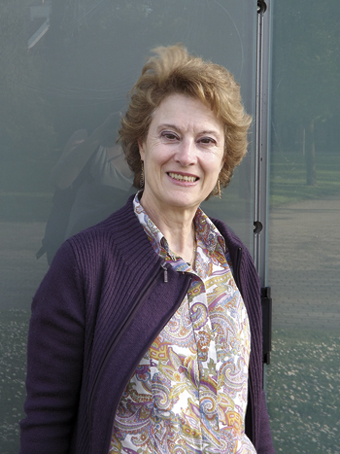 Maria Cruz Landa was about to go to jail to help her make an abortion 24 years ago. She is a gynecologist and currently works at the Women's Care Center. Currently, in the Iturrama district of Pamplona/Iruña. It closely follows the controversy surrounding Gallardón’s proposal. On the contrary, after living for so long, it is optimistic: “We cannot ask ourselves if we have to stop the bill; we have to stop it, and it is over.”
Maria Cruz Landa was about to go to jail to help her make an abortion 24 years ago. She is a gynecologist and currently works at the Women's Care Center. Currently, in the Iturrama district of Pamplona/Iruña. It closely follows the controversy surrounding Gallardón’s proposal. On the contrary, after living for so long, it is optimistic: “We cannot ask ourselves if we have to stop the bill; we have to stop it, and it is over.”
In 1985, the Government authorized abortion in three cases: in case of malformation of the baby, whether the physical or psychological health of the pregnant woman was at risk and whether the pregnancy was the result of rape. Landa was then at the Andraize de la Txantrea clinic. In 1987 she helped a nineteen-year-old girl interrupt her pregnancy under the law, as the fetus could have a serious illness. However, it was denounced by groups opposed to the right to abortion and brought to justice for the same facts. For the three doctors who intervened in the intervention, the Civil Guard asks for three years of imprisonment. Finally, after a process that lasted for four years, they were acquitted in 1990. Since then, no abortion has been practised in Navarre. The trial was a “turning point.”
“The popular movement was so big that we felt part of what was there. We were all shown solidarity: feminist groups, European parliamentarians, neighbourhood associations… it was terrible,” Landa says in her memory. However, it had been hard times: “We had the threat from jail and we didn’t know what could happen to us.” Young people, who had not lost their license, were forced to reconcile prosecution with work with murder. “We paid a bond of 200,000 pesetas, and every 15 days we had to sign in the courthouse. We were working, and there we were running, once signed, to return to the consultation.”
Keep thinking about the days of the trial. The sessions lasted for three days and was a “war of scientists.” They were dedicated to defining what the child is, what it is not... But the experts conducted by the anti-abortion groups had a lower level than the guests: “Beyond ethical and moral reasoning, they had nothing.”
The defense of gynecologists was therefore more solid, however, that is why they did not win: “We won because the people were on our side.” Landa is proud. However, the victory left a sour sweet taste: “This was the last abortion we did in Navarre, then there have been no conditions to act in a normalized way; neither for professionals, nor for women.” Therefore, Landa, a gynecologist, has not been able to help interrupt the pregnancies and has lived “with frustration”.
The argument of the Navarre Parliament to deny the right to abortion has been that medical workers did not want to have abortions. But there have been professionals who have been prepared, like Landa. “In 2006, gynecologists presented a paper in which we were willing to abort, but the government ignored us.”
Currently, she carries out all the work with women before the practice of abortion, but she has to send them to Donostia-San Sebastián, Logroño or Zaragoza. Since 2010, also to Ansoain, to the private clinic.
However, he knows by heart what all that happens at the time of abortion is. In most cases, the contraceptive method has failed or been misused. “We tell the pregnant woman: ‘Once you have made the decision you make, we will support you’ ”. And he has claimed that one election is as legitimate as the other. “People have a clear idea, either they want or they don’t want the child. Few doubts.”
When asked about what abortion is like, he certainly answered: “Very easy.” As for the techniques of medicine, it is “simple”. “Those who oppose abortion are annoyed that it is very easy and would like to present it as something very difficult, but until the ninth week the procedure is simple.” It talks about pharmacological abortion, about breaking the process with an antiprogesterone called mifepristone. The pregnant woman takes the pill and pours the one in the womb, pouring blood similar to menstruation.
He is concerned about the current context. Summarize the bill in two words: “The administrative maze.” He says the process is going to get very complicated. “The consent of the psychologist, the psychiatrist, the doctor, to think for seven days... The goal is to deny abortion itself.”
Yolanda Pérez de Mendiola. Free information for personal decision
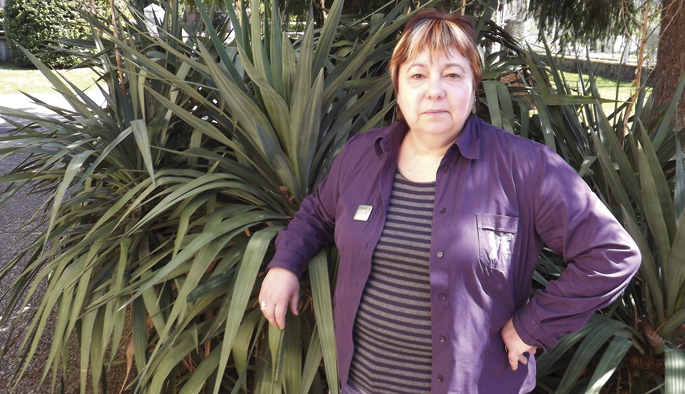
Yolanda Pérez de Mendiola is a sex educator at the Andraize Women's Care Center in Pamplona/Iruña. Her job is to publicize methods to prevent sexually related diseases, solve doubts about sexuality and offer advice for termination of pregnancy. He's fed up with discourses that relate abortion to frivolity. “No one has ever come with a smile in his mouth, it is not an experience lived with indifference.”
It has a little query and a waiting list too inflated. However, it enthusiastically maintains the need. “People of all ages come. We provide information and advice on termination of pregnancy. If the decision is clear, go ahead; if not, we direct psycho-emotional and personal leadership.”
He says there is no concrete profile. “Those who come here are middle class, workers, workers. That does not mean that the high-level do not abort; the point is that they do not do so here. They choose the private route.” The age range is also wide: “They arrive between the ages of 15 and 45, but the most prominent group is that of 25 to 35 years, which is the one that requires the most information.” The prejudice that has spread to society is that younger people mostly abort, but the belief is corrupt, according to Pérez de Mendiola.
The decision is, in most cases, “tough and difficult”. The educator doesn't want to generalize. “Everyone has their own problems.” However, there is the ability to list the arguments that pregnant women use to abort: “Above all, I’ve become pregnant, but this is not the time,” they say. There are other situations. For example, the one who does not want to bring children to his partner; the one who believes that he already has enough children; or the one who cannot keep them economically. The hardest part is working with this last team.
“It’s harder, because they make it limited by external factors,” he stressed. The expert agrees with the analysis performed by ACAIK, the association of clinics for the interruption of pregnancies. Most of them leave the pregnancy because they do not want to: 48.4% say so; 30.7% for economic reasons; 8.8% for age; 6.7% for couple reasons; and 5.5% for medical reasons.
In general, people tend to be “pretty clear” about whether or not they will have a child. However, there is one case of initial abortion that has maintained the pregnancy: “It rarely happens, but it is true that, on some occasion, there have been people who have raised abortion and have not done so because of religious or moral beliefs.”
Perez de Mendiola has been put back many times. When she started, abortion was illegal and, although she reported, the villages were going to go abroad. “Those who had money went to Paris, London or Amsterdam; those who did not have money to Biarritz or Hendaia.”
In addition, clandestine abortion was common: “It was the poorest who did so in the worst health conditions.” In 1976, for example, although abortion was condemned to prison, 10,000 women suspended the process in their homes. Now, the educator believes that clandestine abortions could be increased.
Perez De Mendiola, despite the fact that since 1985 interventions began in the Spanish State, is very pessimistic about this time. “All women were ‘crazy’, they all had to say they had some kind of psychological illness, such as depression or anxiety.”
He believes that changing the law can lead to the same situation: "Again, many will have to declare that they have a mental illness. And some will resort to illegal practices.” See the landscape with anguish, with anguish. It says that the current legality must be maintained, because if not, “we are going to go back over 30 years.”
Duela aste batzuk, gurean egon ziren El Salvadorko eta Kanarietako emakumeen eskubideen aldeko hainbat aktibista. Sexu- eta ugalketa-eskubideez eta eskubide horiek urratzeak emakumeengan dituen ondorioez aritu gara; hala nola El Salvadorren berezko abortuak izanda homizidio... [+]
A few weeks ago we heard Trump in the televised debate on the existence in his country of democratic states that authorize abortion after the birth of his son.
Judging by the character, it seems an absurd and improvised idea, but that same falsehood was heard in 2019 by Adolfo... [+]
Abortuaren eskubidea Frantziako konstituzioan sartu da aste honetan. Baina abortatzeko eskubidea ez da gaur goizeko afera. Jadanik 1970. hamarkadaren hasieran mugimendu azkarrak izan ziren eskubide horren erdiesteko Ipar Euskal Herrian.
Espainiako Estatuan Abortuaren aurkako lobbyak Abortuaren Legea erausteko beste saiakera bat egiten ari dira Gaztela eta Leonen. Hango gobernukide den Vox-ek iragarri du abortatu nahi duten emakumeei fetuaren taupadak entzunarazi edota ekografiak ikusaraziko dien protokoloa... [+]









